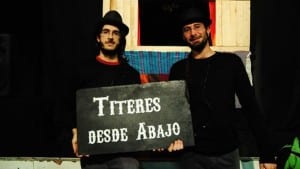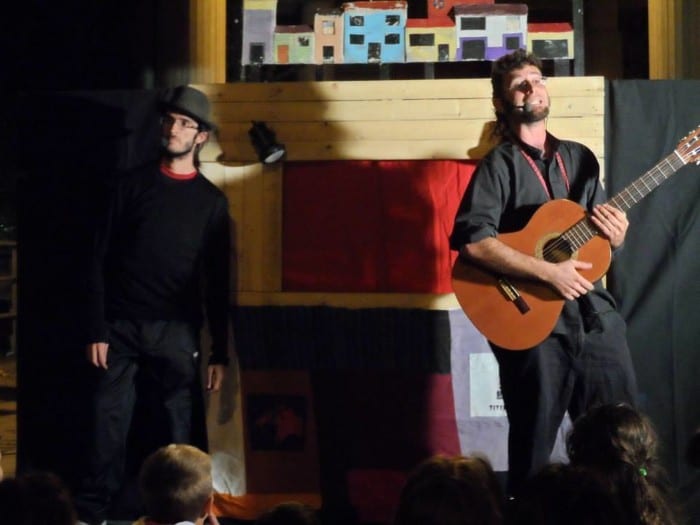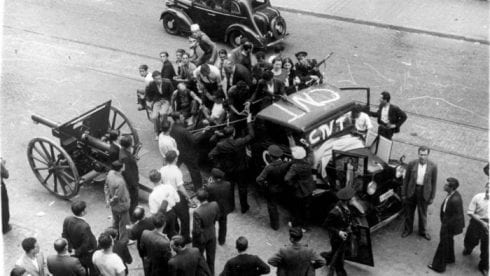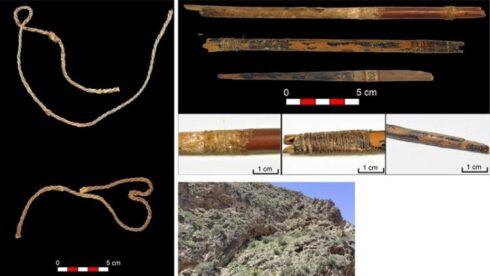A PUPPET show in Madrid has become the latest battleground in the long struggle between Spanish radicalism and the corridors of power.
The arrests of the puppeteers – named only as Alfonso Lázaro, aged 29, and Raul Garcia, aged 34 – for ‘glorification of terrorism’ has sparked a fierce political row (praising terrorism has been a crime in Spain since 1995).

The men, from Granada theatre company Titeres Desde Abajo, were in prison for five days following their arrest at their show during Madrid’s carnival celebrations on February 5.
In a two-sided verbal showdown reminiscent of the real Punch and Judy puppets, the hard-left CNT-AIT trade union has denounced the arrests. Madrid Mayor Manuela Carmena has apologised furiously for the ‘deplorable’ show (which her town hall funded and promoted).
Meanwhile, the puppeteers’ supporters have adopted last year’s Charlie Hebdo slogan with their hashtag Je suis titiritero (I am the puppeteer). Large demonstrations backing the men have been held in Madrid. Pablo Iglesias has even waded into the row.
“It is absurd that in a democratic country someone can find himself in jail for a work of theatre,” said the Podemos leader.
The two were detained following complaints from parents in the audience about their show The Witch and Don Cristóbal. Court documents claim the play featured the hanging of a judge and the rape and murder of a nun.
In one scene, a banner bearing the motto Gora Alka-ETA is raised. This slogan – supposedly a reference to ETA and Al-Qaida – is what put the men behind bars in solitary confinement and facing serious charges.

But the CNT-AIT have branded those responsible for their imprisonment ‘Iberian Taliban’.
“The fact that this performance uses puppets does not automatically mean that it is kid friendly,” a CNT-AIT spokesman told The Olive Press.
“It is not glorifying any terrorism act or propaganda in the show whatsoever.”
Rather, the CNT-AIT claim, the play is an allegory which stands for ‘social harmony, tolerance and respect’, the witch representing society’s marginalised people, the judge representing the law and the nun representing religion.
In a statement, the union also lashed out at Spain’s Ley Mordaza – Gag Law – which has seen activists arrested and free speech curtailed.
“The difference between the judge in the play, who condemns the witch, and the judge in real life, who condemns the puppeteers, is the material they’re made out of: the first is made of rags and the second is an ex-policeman who used to serve the fascist dictator Franco and is now a judge in the Spanish court,” the CNT-AIT spokesperson explained.
The CNT-AIT’s backing is a reminder that Spanish radicalism is still alive and well, 150 years after Italian firebrand Giuseppe Fanelli introduced anarchism to Spain.
But the case raises age-old questions about freedom of speech and artistic expression.
‘Who breaks a butterfly on a wheel?’, asked 18th-century satirist Alexander Pope. Certainly the imprisonment of two glove puppeteers seems like a massive over-reaction.
It is also an affront to Spain’s proud history of iconoclastic art, where artists from Francisco Goya to Pedro Almodovar have used their medium to attack and mock the country’s most powerful institutions.

For Manuela Carmena, who was elected last May on a radical platform, the incident is the latest in a number of recent controversies she has become embroiled in.
Two weeks ago, the Ahora Madrid leader’s decision to purge the Spanish capital of all Francoist symbols came under fire when a plaque commemorating nuns murdered during the Spanish Civil War was removed. Critics also hit out at the lack of tradition at this year’s Three Kings parade in Madrid.
The arrest of the two previously unknown puppeteers has become yet another major cause celebre in the city, another molehill of controversy that has grown into a mountain of trouble for Madrid’s mayor.












They only can be imprishoned if they have made propaganda of terrorist organizations, and only in this case. Not for the rest of his performance.